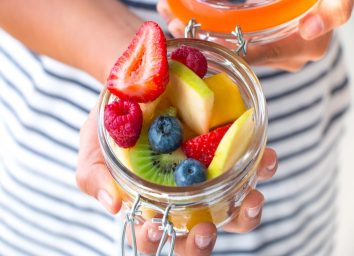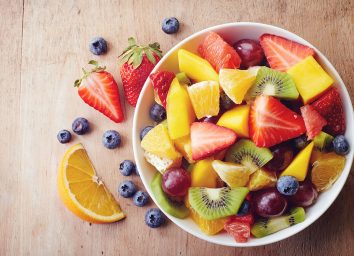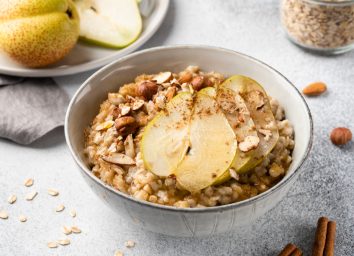10 Healthiest Fruits To Eat Every Day
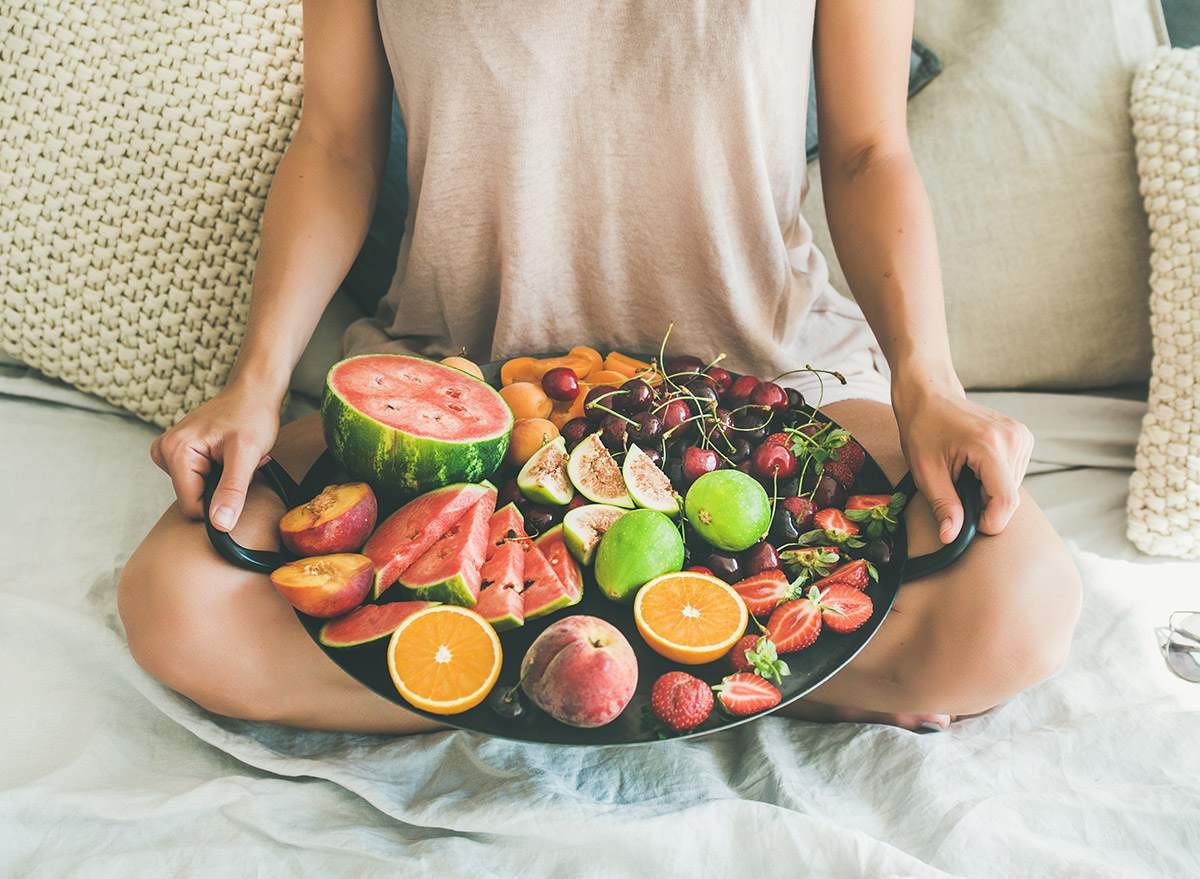
You might assume that nature’s candy—aka fruit—would be easy enough to eat on a daily basis. In addition to being healthy, most fruit is sweet, hydrating, and overall delicious. However, only about 12% of Americans eat the recommended one and a half to two cups of fruit a day, according to a report from the CDC.
Eating fruit, especially on a regular basis, helps you get essential vitamins and minerals, antioxidants, and fiber. For the most part, people who eat more fruit have a reduced risk of heart attacks, stroke, and cancer. In fact, a 2021 Australian study found that people who ate at least two servings of fruit a day were 36% less likely to develop type 2 diabetes than those who ate less than half a serving daily. But, with so many different kinds of fruit, which ones should you choose?
First of all, you can’t go wrong with adding more fruit to your regular diet. That said, some types of fruit stand out among the rest as nature’s superstars. Here are 10 fruits dietitians say you should be eating every day—and for more healthy eating tips that will encourage you to eat more fruits and veggies, be sure to check out 5 Best Fruits and Vegetables To Eat for Weight Loss.
Apples
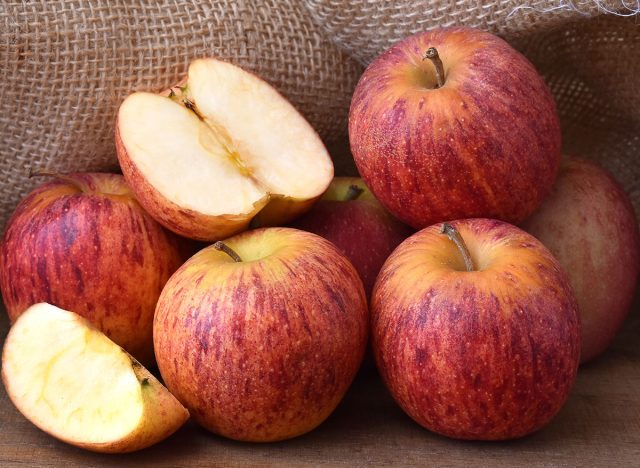
Apples are an excellent source of fiber, particularly pectin, a soluble fiber that’s particularly helpful for your gut and heart.
“Apples are very rich in fiber which provides several health benefits, such as helping to lower your cholesterol, says Brittany DeLaurentis MPH, RD, CSO, LD, founder of Brittany Lynn Nutrition.
A small February 2020 study from the American Journal of Clinical Nutrition found that two apples per day for 8 weeks reduced total cholesterol, LDL cholesterol, triglycerides, and other markers of heart disease in people with mildly high cholesterol levels.
One type of fiber found in apples is pectin, a type of soluble fiber. “Pectin is also prebiotic, which means it helps feed your good gut bacteria,” says registered dietitian Amanda Sauceda, MS, RD.
“Interestingly, the pectin in apples may also play a role in helping allergies by impacting your gut microbiome,” DeLaurentis explains.
RELATED:
Mangoes
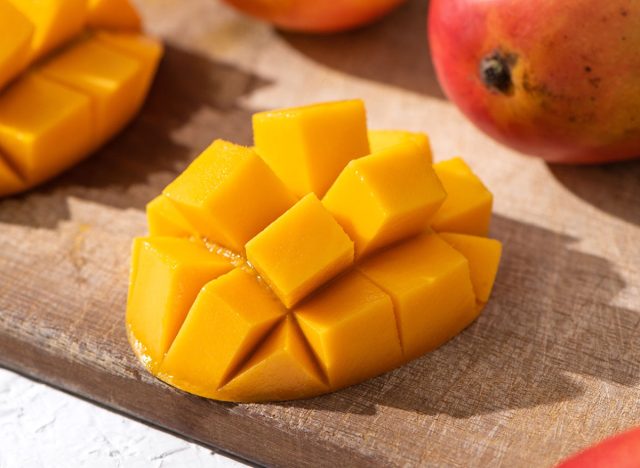
This sweet and creamy tropical fruit dresses up any fruit bowl with its rich yellow hue. One cup of mango has 2.6 grams of fiber, 67% of your DV for vitamin C, and 60% of your DV for vitamin A.
“The gorgeous yellow color of mangos is thanks to carotenoids which is a plant compound that can be anti-inflammatory,” says Sauceda.
Mangoes are one of the best sources of carotenoids, which can be found in its pulp and peel. Carotenoids play a role in reducing cancer risk and protecting vision.
Cherries
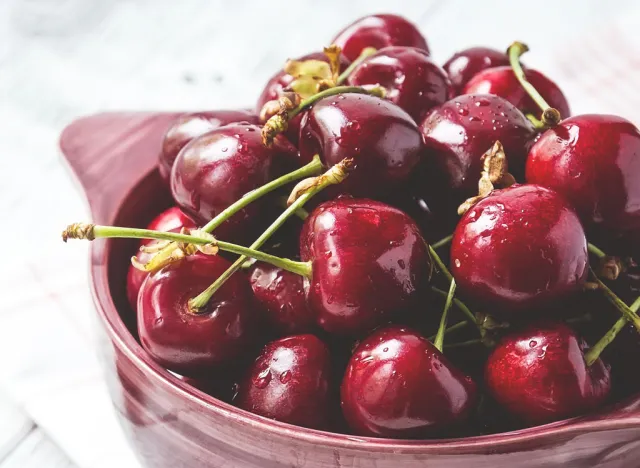
“Cherries are a delicious and nutritious fruit that’s packed with health-promoting nutrients, including antioxidants and anti-inflammatory compounds, which may offer numerous health benefits, such as reducing inflammation and oxidative stress,” says Maya Oueichek, MBA, RDN.
No matter which type of cherry you choose, sweet or tart, you’ll reap the inflammation-fighting benefits. Several studies have found various amounts of antioxidants in sweet cherries and tart cherries, depending on the type of test completed.
Strawberries
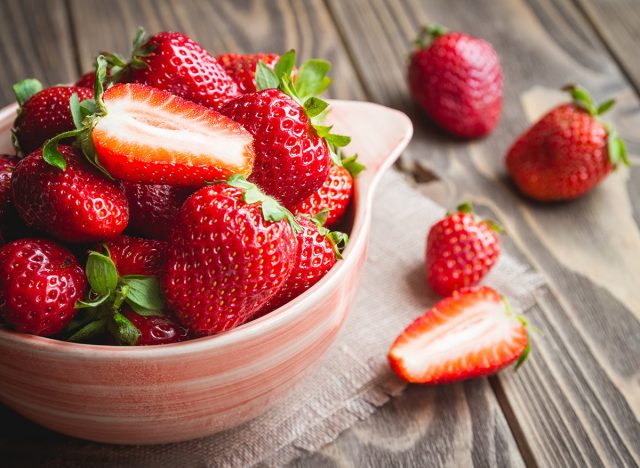
Strawberries are a versatile and healthy fruit that has a portion size larger than most other fruit. Plus, even though they’re sweet as can be, they’re an excellent choice for people with diabetes or on a low-carb diet.
“A serving of strawberries is one and a quarter cup which is equivalent to 15 grams of carbohydrate and three grams of fiber, making this a good fruit choice for people with diabetes,” says Toby Smithson, RD, registered dietitian, certified diabetes care and education specialist, founder of Diabetes EveryDay, and author of Diabetes Meal Planning and Nutrition for Dummies.
Ever wonder what gives strawberries their deep red color? “[They’re] a great source of the antioxidant anthocyanin, which has been shown to reduce inflammation, oxidative stress, and insulin resistance which are all risk factors associated with type 2 diabetes,” says Smithson.
Blueberries
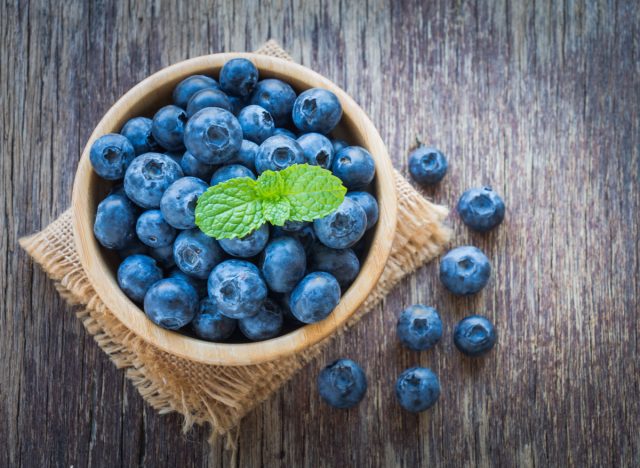
“Once you pop, you just can’t stop” should have been written about these blue beauties. It’s easy to eat a handful (or several) in one sitting, but thankfully blueberries are just as healthy as they are delicious.
Blueberries are full of antioxidants, and eating berries at least twice a week is an important part of the MIND Diet, a diet that has neuroprotective effects, explains registered dietitian Christina Iaboni, RD.
Instead of always snacking on regular blueberries, give wild blueberries a try. They’re loaded with anti-inflammatory benefits and have two times more health-helping antioxidants than conventional blueberries, explains Amy Gorin, MS, RDN, an inclusive plant-based registered dietitian nutritionist.
“Regularly eating wild blueberries has been shown to help improve memory and slow brain aging,” says Gorin. One small 2018 study published in the European Journal of Nutrition found that older adults who ate one cup of fresh blueberries daily for three months had significant improvements on mental cognition tests.
Prunes
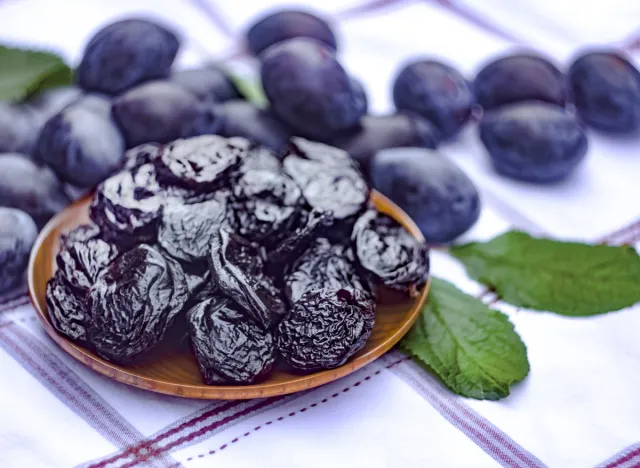
If fresh fruit is hard to come by or keep around, try prunes. Prunes are dried plums that are perfect for keeping in your pantry for a nutrient boost added to salads, smoothies, or just to snack on.
“Eating just five to six prunes provides three grams of fiber and a big boost for bone health,” explains Gorin.
One small study found that just five prunes a day prevented total body bone mineral density in a group of older women with osteoporosis. Researchers give credit to prunes’ ability to reduce the breakdown of bone—although they aren’t yet sure about the mechanism behind it.
Bananas
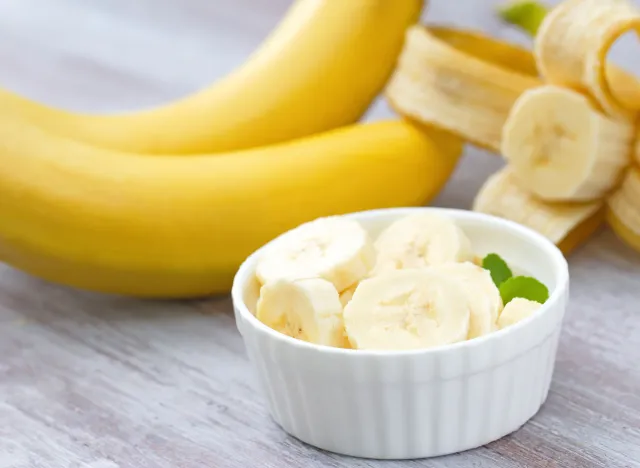
There’s nothing more convenient than a fruit that comes in its own neat little package. While some naysayers in the past have accused bananas of being too high in sugar, they’re actually the perfect fruit to provide energy on the go. One of my favorite times to eat bananas is pre-workout. They’re easy to digest, and one medium banana has 27 grams of carbohydrates to fuel a run or spin class.
“All produce is nutritious and has benefits, but the best produce is whatever you can maintain in your diet based on your family and economic constraints, and bananas often fit the bill,” says Sharon Puello, MA, RD, CDN, CDCES.
If your grocery budget is stretched thin, bananas make it easy to eat and serve fruit each day. Buy more than you need when they’re on sale, sometimes as low as $0.20 each, and pop what you can’t eat into the freezer to add a big nutrient burst to breads, muffins, and smoothies.
Avocados
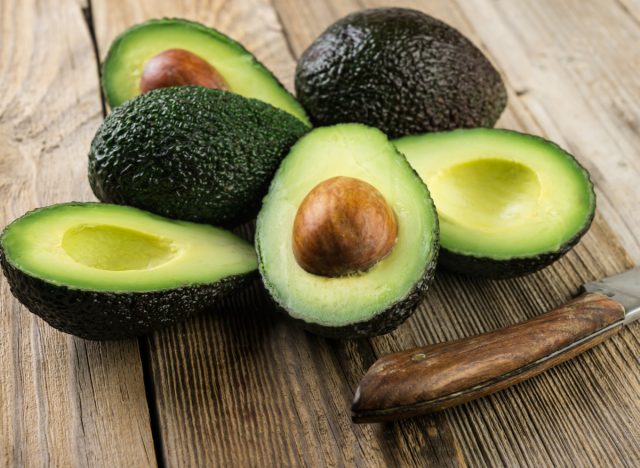
Avocados aren’t sweet, but they’re definitely a fruit you should be eating. While most fruits are high in natural sugars, avocado boasts healthy fats and fiber as its star nutrients.
“One-third of an avocado has 100 calories, 9 grams of healthy fat, and a whopping four grams of fiber.” With all that fiber, avocado is a great fruit to eat for gut health, explains Sauceda.
As if a healthy gut wasn’t enough, avocado could help keep your heart healthy too. “This green fruit also has healthy fats and potassium making it good for your heart health,” says Sauceda. Studies have found that replacing other fats with avocado can help to lower LDL cholesterol (the bad kind).
Raspberries
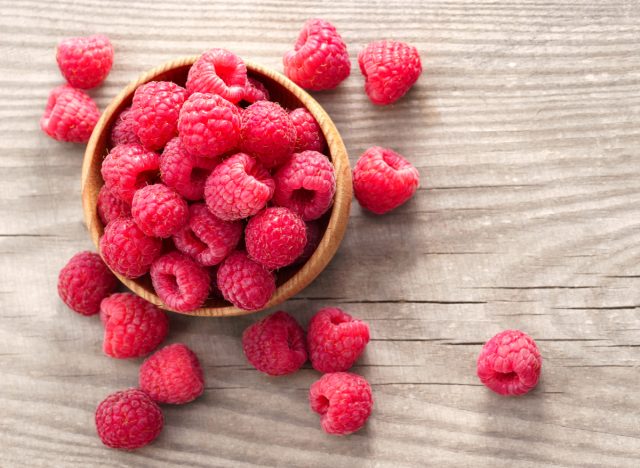
When it comes to fiber, not many fruits compare to raspberries. One cup of raspberries has eight grams of fiber and only 64 calories. A diet high in fiber can help you manage a healthy weight, keep your bowels moving regularly, and even lower your cholesterol. Add a cup of raspberries to your morning yogurt for 21% of the daily fiber needs for a man and 32% if you’re a woman. Fiber’s not the only thing that makes raspberries stand out as a fruit you should be eating.
“Raspberries are full of antioxidants, anthocyanins, and vitamin C, all of which fight inflammation and promote healthy aging,” says registered dietitian Justine Chan MHSc, RD, CDE.
Watermelon
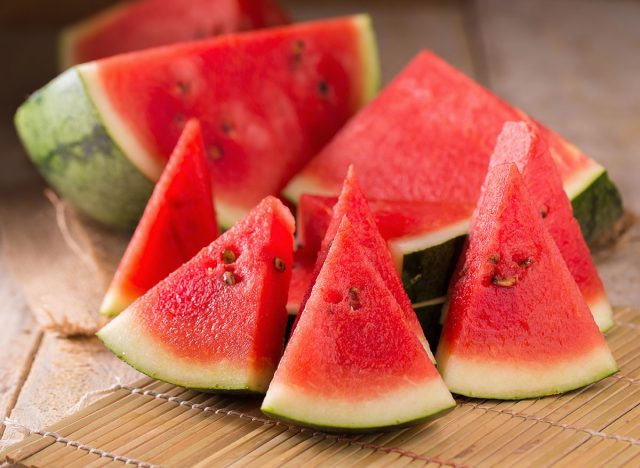
Nothing goes better with a summer picnic than a big juicy slice of watermelon. This summertime staple doesn’t only taste good, it’s also bursting with health benefits.
“Watermelon is high in lycopene, an antioxidant which studies suggest can lower the risk of certain cancers and improve heart health,” says Rachel Rothman, MS, RD, CLEC. Lycopene helps give watermelon its red color and can be found in other foods like tomatoes, grapefruit, and papaya.
If you typically toss the watermelon rind in the trash or compost bin, you’re missing out on a lot of amazing nutrition. The watermelon rind is actually edible! “It’s rich in fiber and contains beneficial amino acids, like citrulline, which some studies have shown to boost heart health,” says Rothman.
A previous version of this story was originally published on June 4, 2022. It has been updated to include additional copy and proofreading revisions, more research, and updated contextual links.
- Source: https://www.cdc.gov/mmwr/volumes/71/wr/mm7101a1.htm
- Source: https://www.myplate.gov/eat-healthy/fruits#mp-container-706194
- Source: https://academic.oup.com/jcem/article/106/10/e4097/6290732
- Source: https://www.ncbi.nlm.nih.gov/pmc/articles/PMC6997084/?fbclid=IwAR3tZNgTR-gBz6QxIC_gOpeoiHkcoJl4xiFdZu-L8GUY1pMddLmSXXOoJgc
- Source: https://www.ncbi.nlm.nih.gov/pmc/articles/PMC8433104/
- Source: https://tools.myfooddata.com/nutrition-facts/169910/wt1/1
- Source: https://www.ncbi.nlm.nih.gov/pmc/articles/PMC7830918/
- Source: https://www.ncbi.nlm.nih.gov/pmc/articles/PMC7139534/
- Source: https://www.ncbi.nlm.nih.gov/pmc/articles/PMC5872786/
- Source: https://pubmed.ncbi.nlm.nih.gov/28283823/
- Source: https://pubmed.ncbi.nlm.nih.gov/26902092/
- Source: https://tools.myfooddata.com/nutrition-facts/173944/wt5/1
- Source: https://tools.myfooddata.com/nutrition-facts/171705/wt4/0.3
- Source: https://www.nmcd-journal.com/article/S0939-4753(21)00002-8/fulltext?fbclid=IwAR0X3INY1JQsTreGqA0POdtJQDdXhQMm54AU2Yx4caaU1zJmLFKP4Bz36ak
- Source: https://tools.myfooddata.com/nutrition-facts/167755/wt1/1

